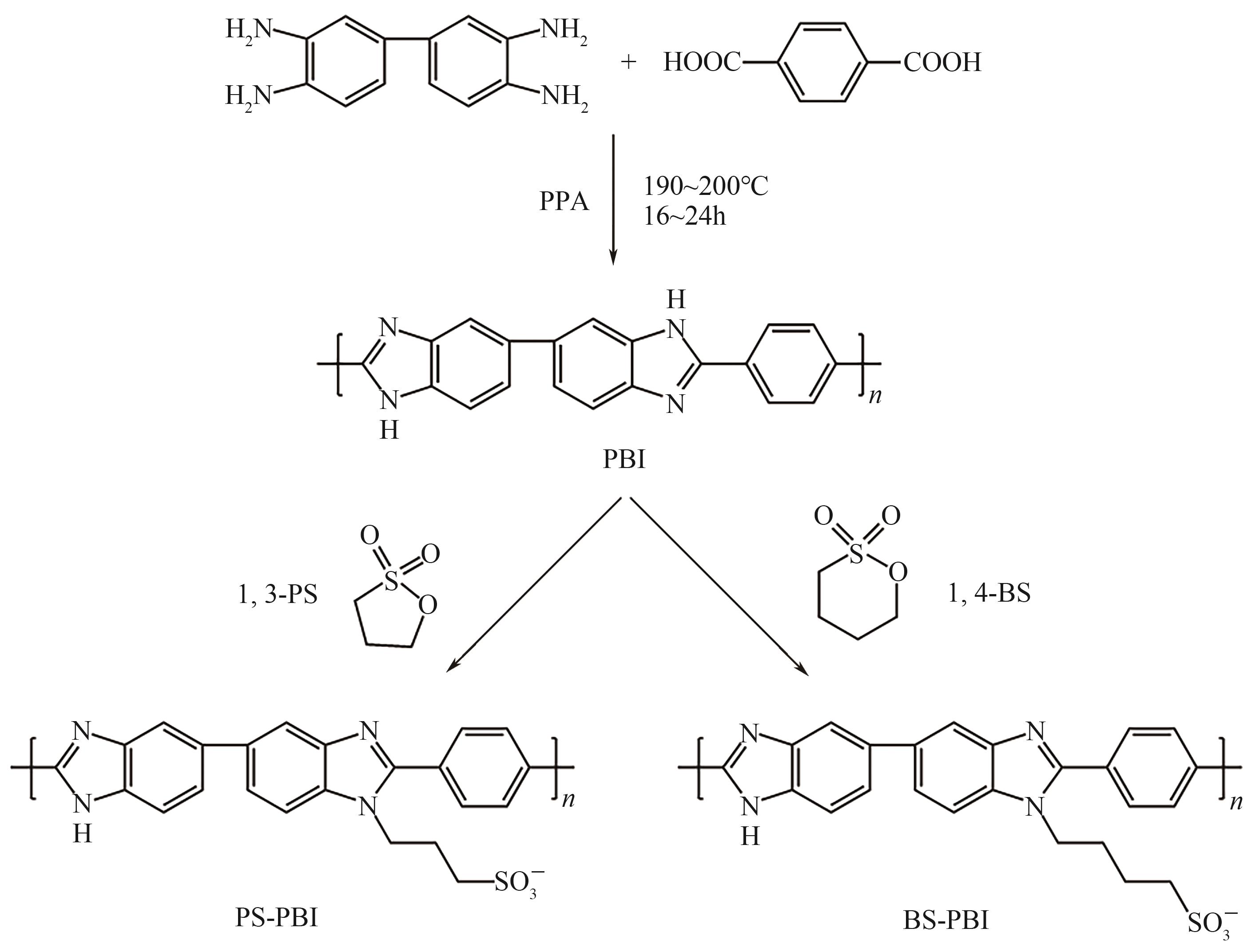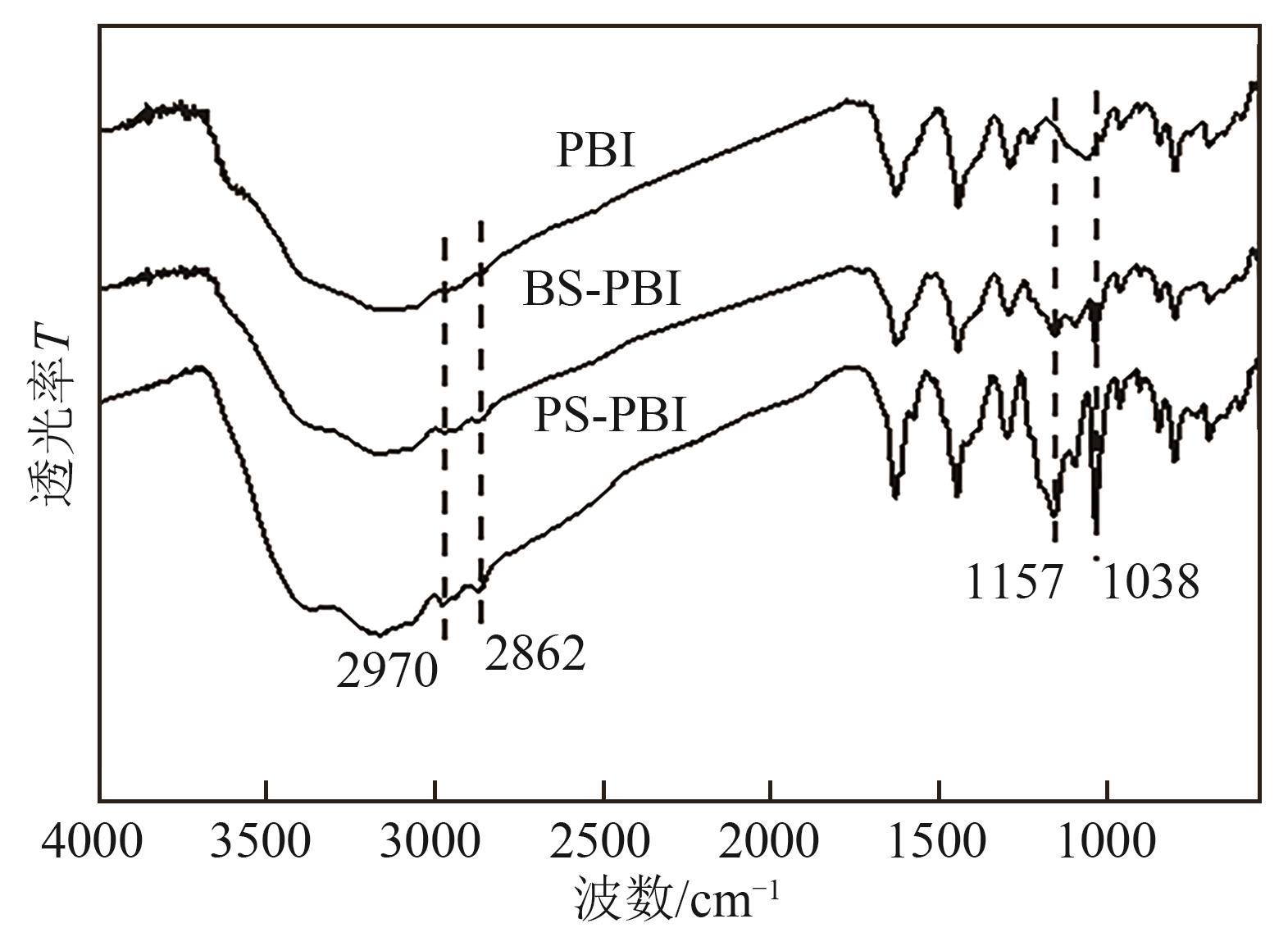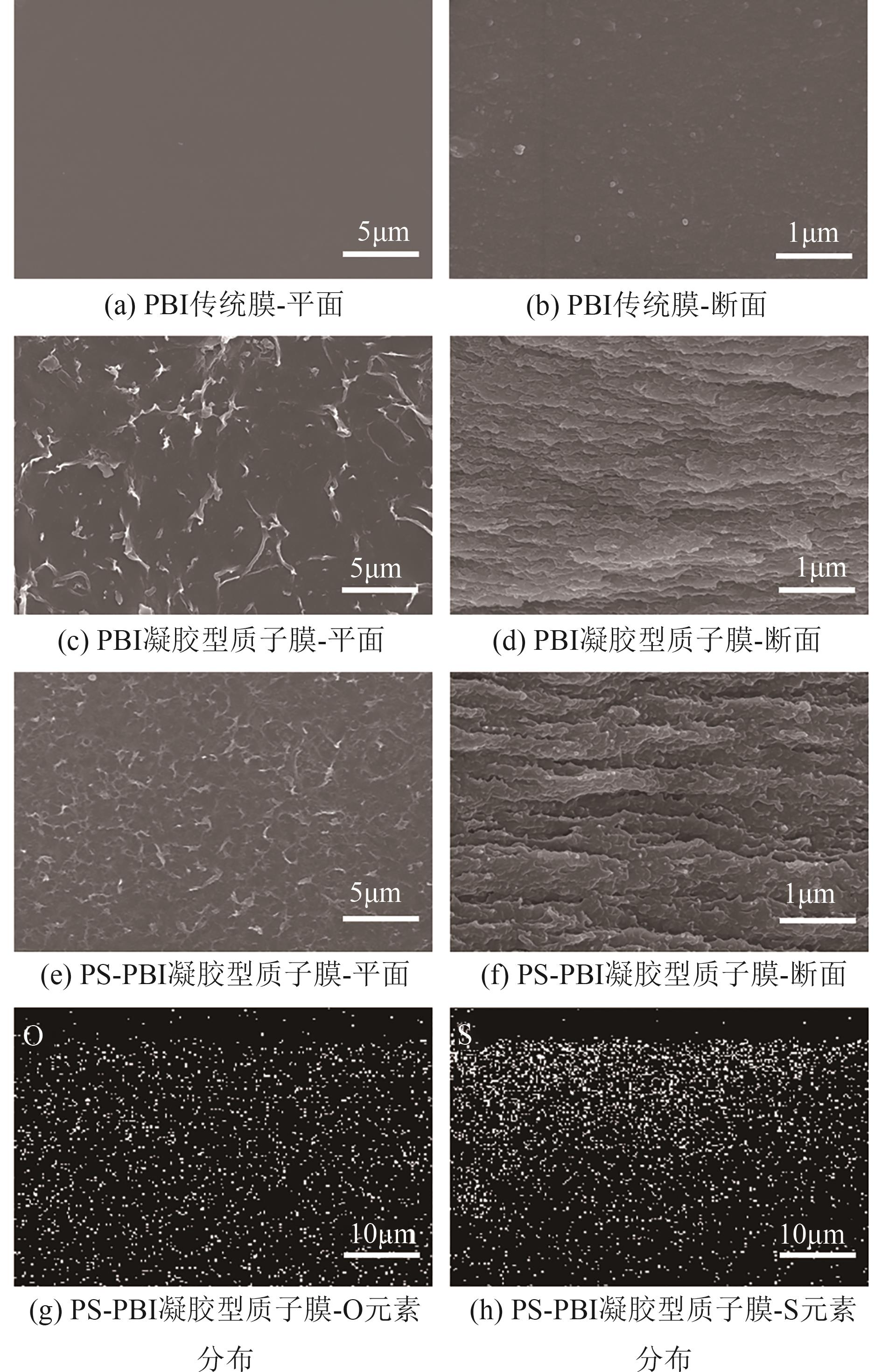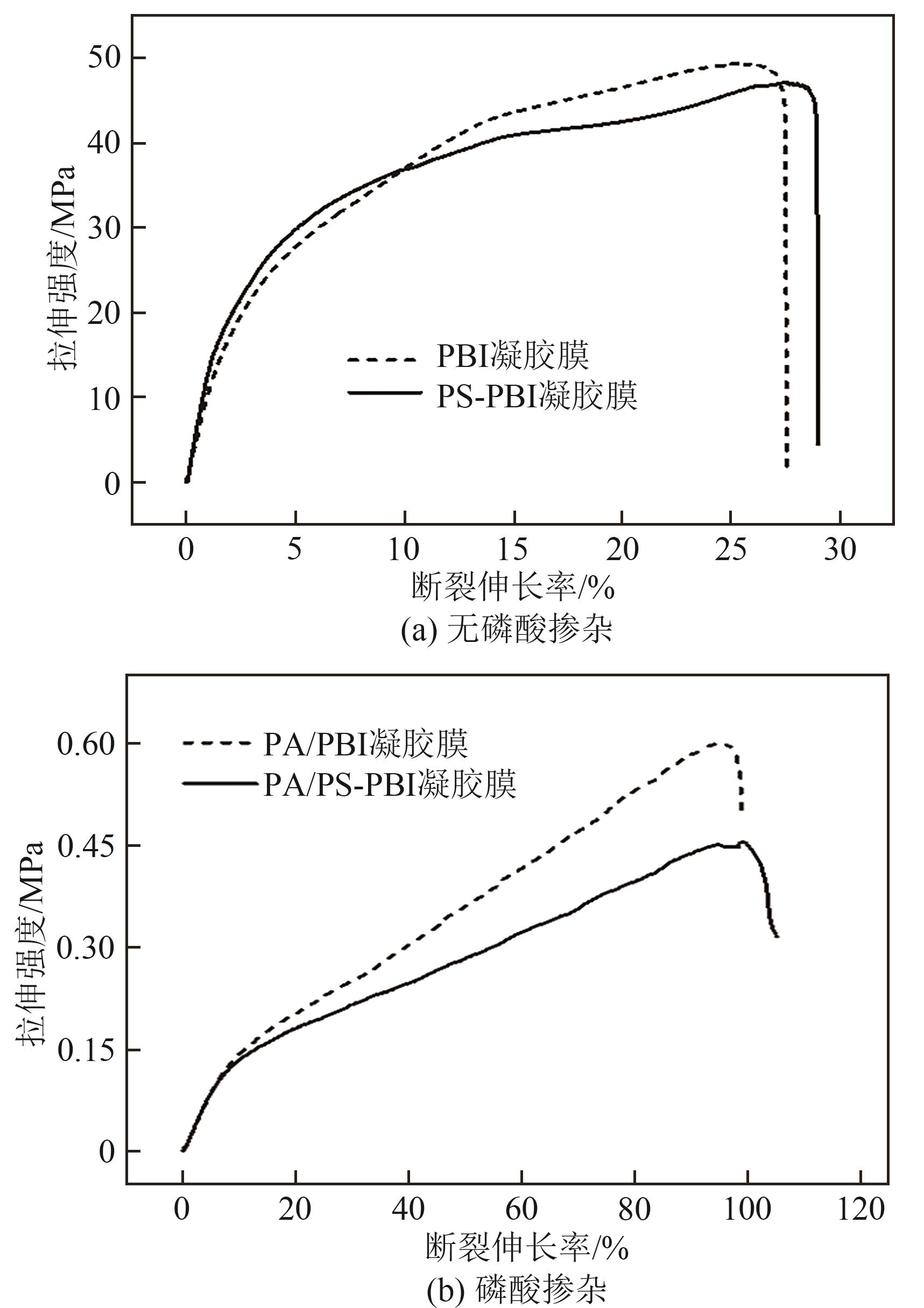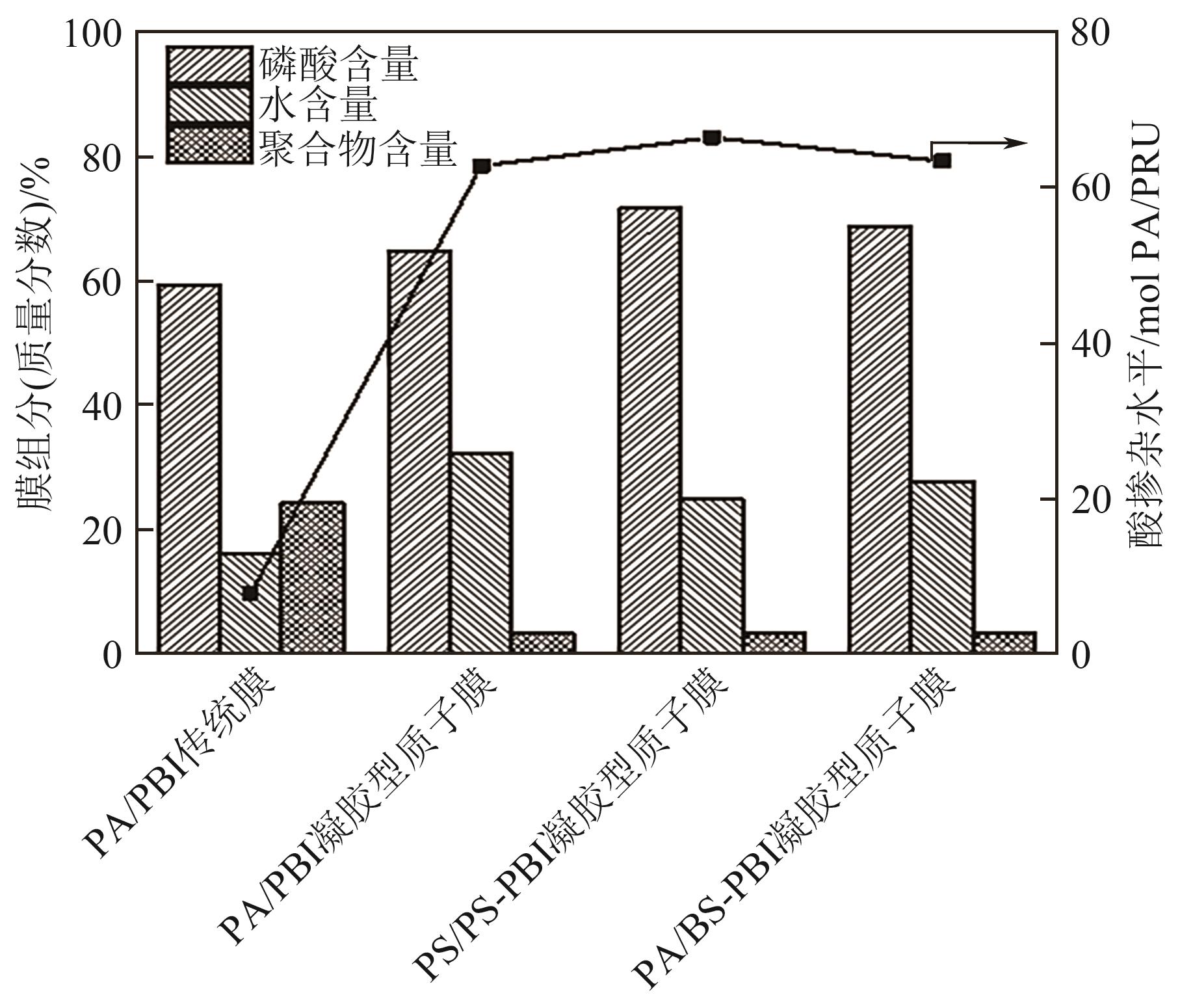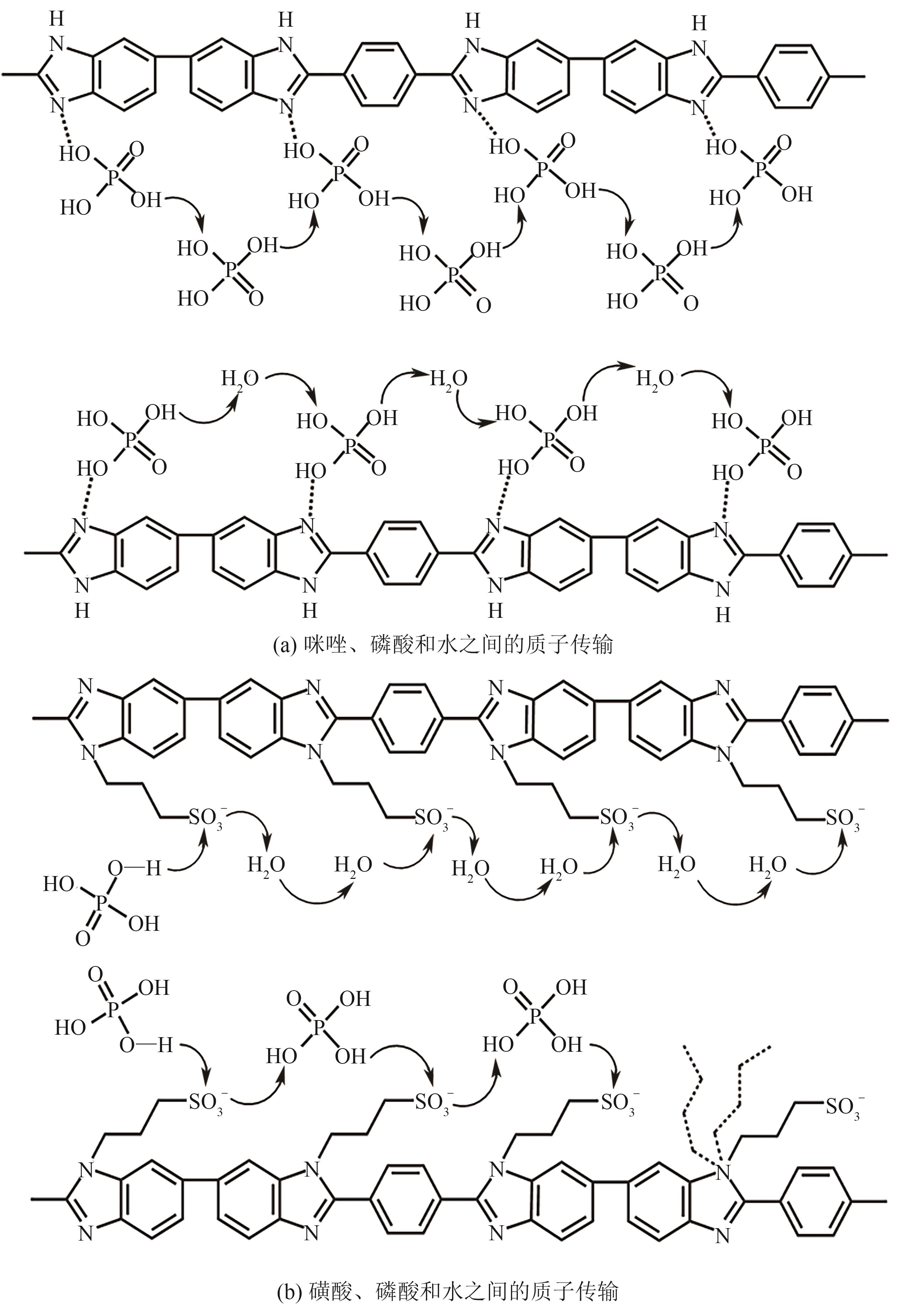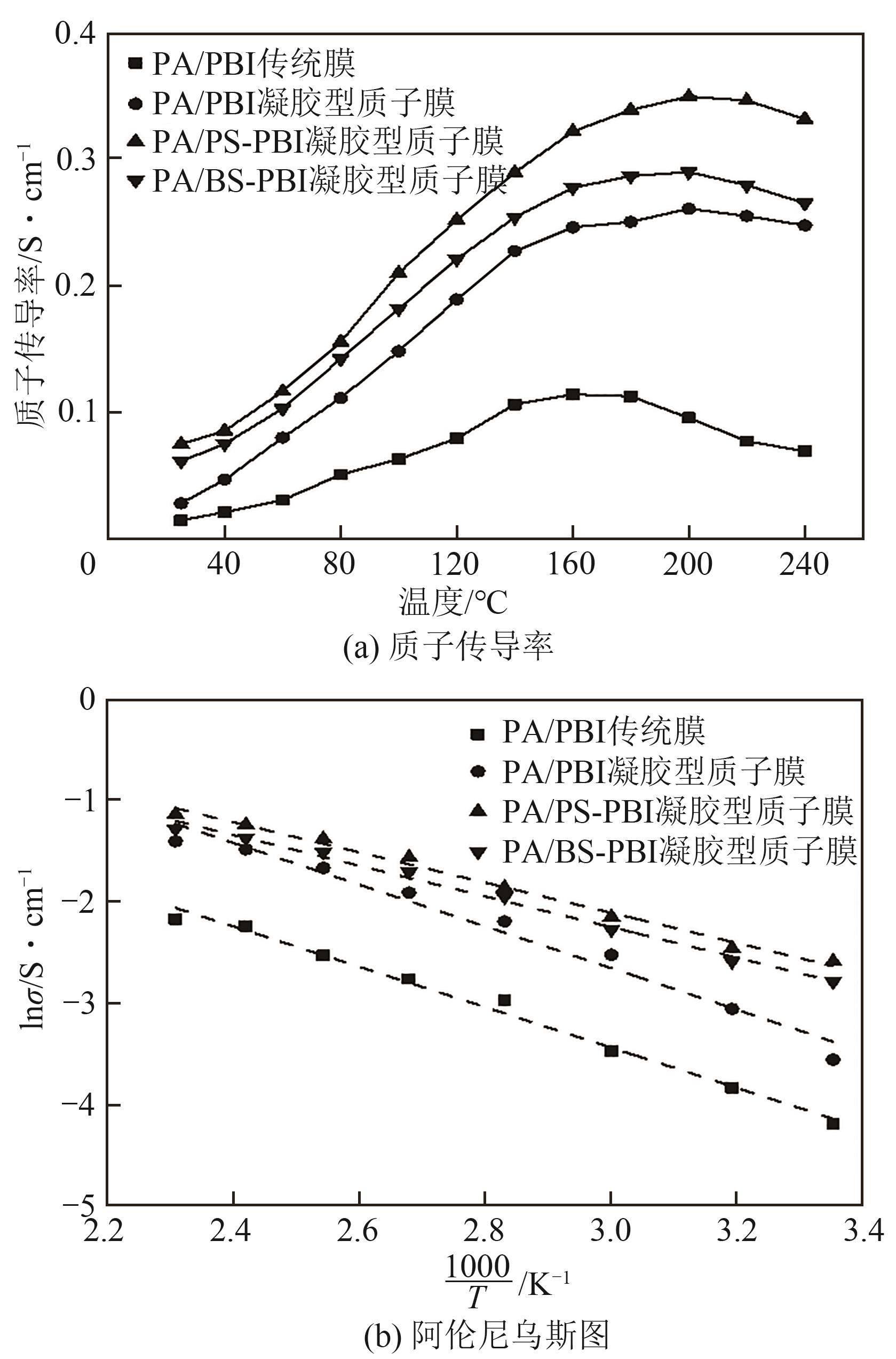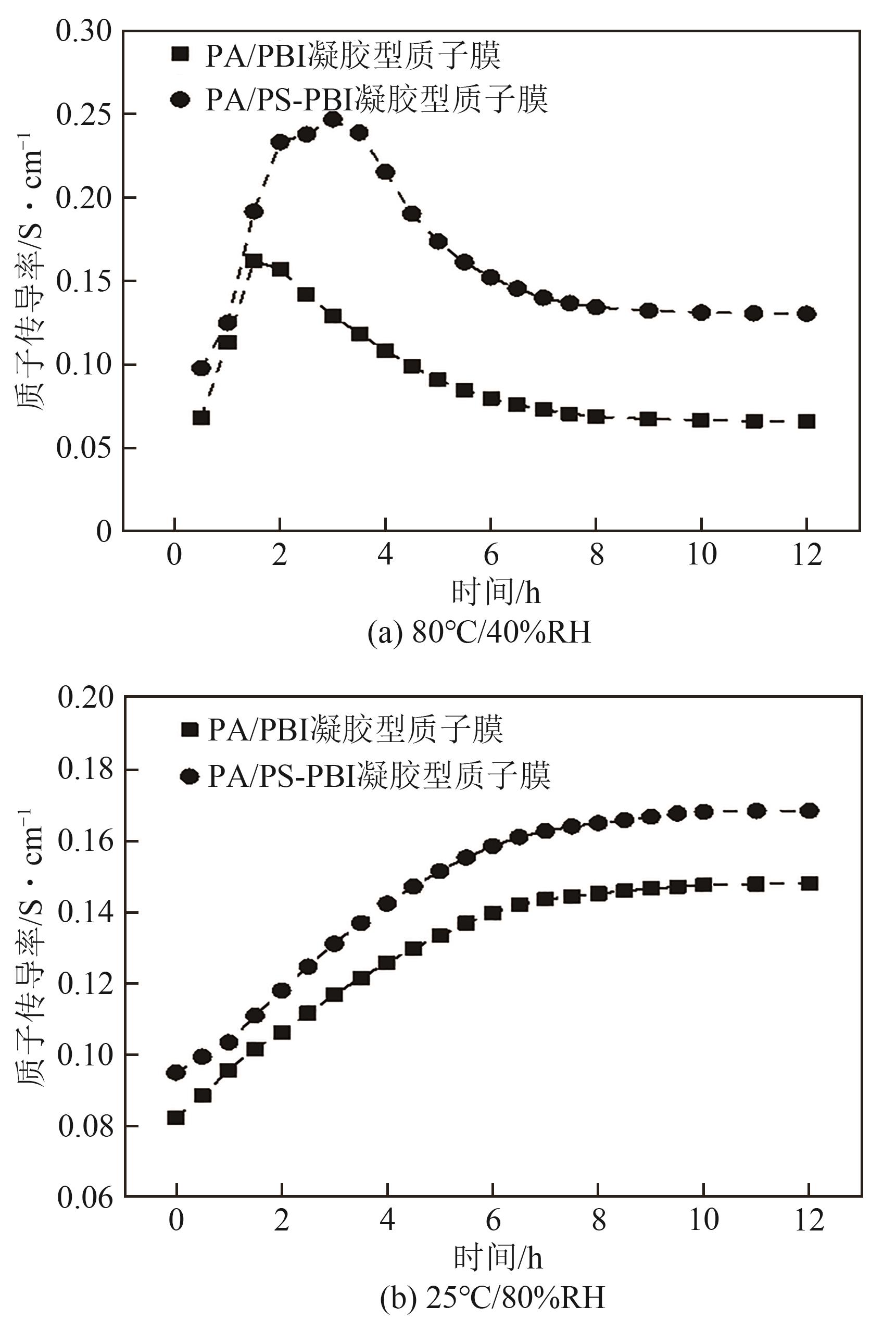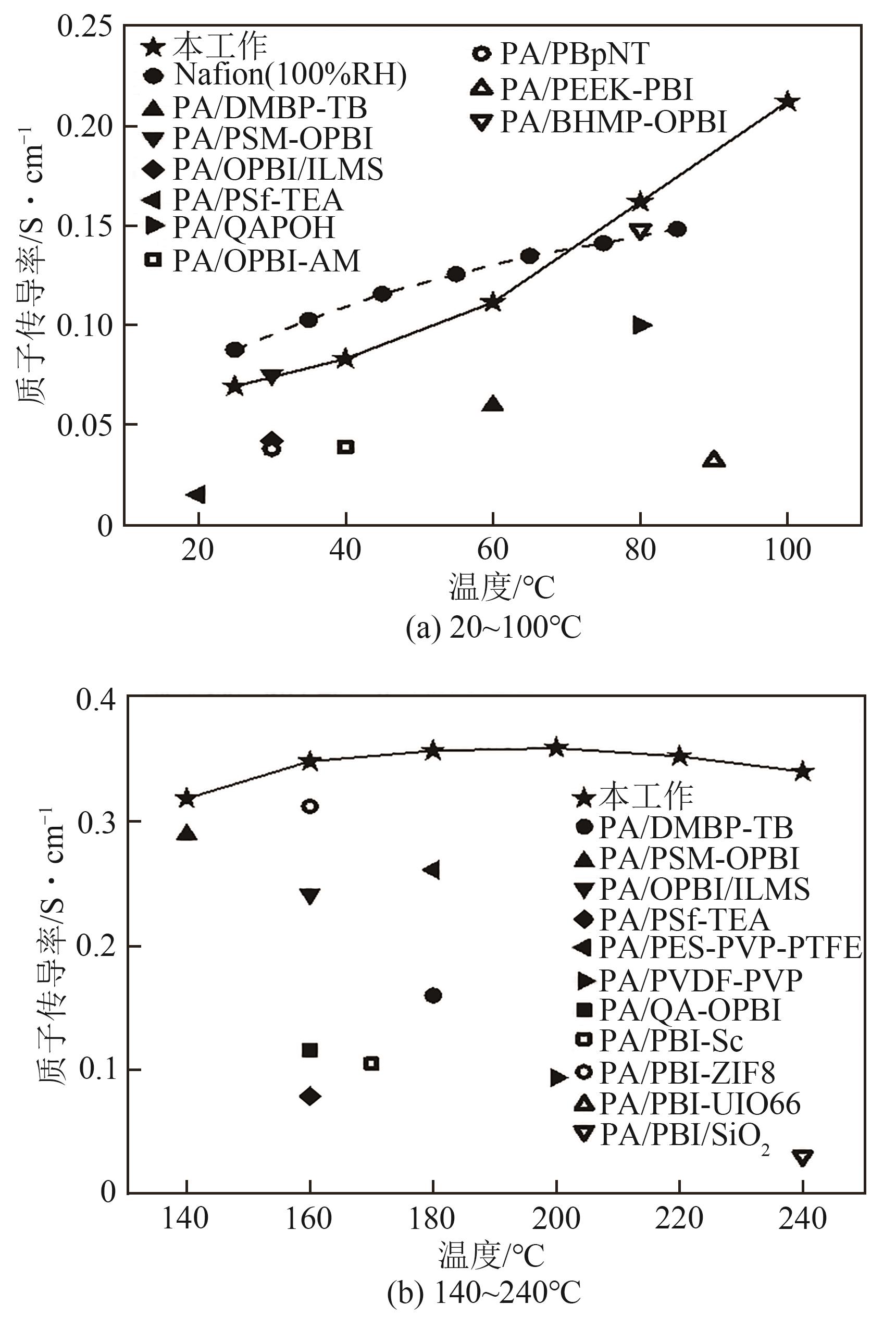Chemical Industry and Engineering Progress ›› 2024, Vol. 43 ›› Issue (4): 1962-1971.DOI: 10.16085/j.issn.1000-6613.2023-0636
• Materials science and technology • Previous Articles
Preparation and characterization of gel polybenzimidazole proton exchange membrane with alkyl sulfonic acid side chains
ZHU Taizhong1( ), ZHANG Liang1, HUANG Zequan1, LUO Lingping1, HUANG Fei1(
), ZHANG Liang1, HUANG Zequan1, LUO Lingping1, HUANG Fei1( ), XUE Lixin1,2(
), XUE Lixin1,2( )
)
- 1.Center for Membrane Separation and Water Science & Technology, College of Chemical Engineering, Zhejiang University of Technology, Hangzhou 310014, Zhejiang, China
2.College of Chemistry and Materials Engineering, Wenzhou University, Wenzhou 325035, Zhejiang, China
-
Received:2023-04-19Revised:2023-05-27Online:2024-05-13Published:2024-04-15 -
Contact:HUANG Fei, XUE Lixin
具有烷基磺酸侧链的凝胶型聚苯并咪唑质子交换膜的制备与表征
朱泰忠1( ), 张良1, 黄泽权1, 罗伶萍1, 黄菲1(
), 张良1, 黄泽权1, 罗伶萍1, 黄菲1( ), 薛立新1,2(
), 薛立新1,2( )
)
- 1.浙江工业大学化工学院膜分离与水科学技术中心,浙江 杭州 310014
2.温州大学化学与材料工程学院,浙江 温州 325035
-
通讯作者:黄菲,薛立新 -
作者简介:朱泰忠(1996—),男,硕士研究生,研究方向为膜科学与技术。E-mail:443985987@qq.com。 -
基金资助:国家自然科学基金(NSF22209147)
CLC Number:
Cite this article
ZHU Taizhong, ZHANG Liang, HUANG Zequan, LUO Lingping, HUANG Fei, XUE Lixin. Preparation and characterization of gel polybenzimidazole proton exchange membrane with alkyl sulfonic acid side chains[J]. Chemical Industry and Engineering Progress, 2024, 43(4): 1962-1971.
朱泰忠, 张良, 黄泽权, 罗伶萍, 黄菲, 薛立新. 具有烷基磺酸侧链的凝胶型聚苯并咪唑质子交换膜的制备与表征[J]. 化工进展, 2024, 43(4): 1962-1971.
share this article
Add to citation manager EndNote|Ris|BibTeX
URL: https://hgjz.cip.com.cn/EN/10.16085/j.issn.1000-6613.2023-0636
| 材料 | 活化能Ea/kJ·mol-1 |
|---|---|
| PA/PBI传统膜 | 16.52 |
| PA/PBI凝胶型质子膜 | 17.07 |
| PA/PS-PBI凝胶型质子膜 | 13.66 |
| PA/BS-PBI凝胶型质子膜 | 12.57 |
| 材料 | 活化能Ea/kJ·mol-1 |
|---|---|
| PA/PBI传统膜 | 16.52 |
| PA/PBI凝胶型质子膜 | 17.07 |
| PA/PS-PBI凝胶型质子膜 | 13.66 |
| PA/BS-PBI凝胶型质子膜 | 12.57 |
| 1 | DAUD W R W, ROSLI R E, MAJLAN E H, et al. PEM fuel cell system control: A review[J]. Renewable Energy, 2017, 113: 620-638. |
| 2 | PEIGHAMBARDOUST S J, ROWSHANZAMIR S, AMJADI M. Review of the proton exchange membranes for fuel cell applications[J]. International Journal of Hydrogen Energy, 2010, 35(17): 9349-9384. |
| 3 | 孙媛媛, 屈树国, 李建隆. 质子交换膜燃料电池用磺化聚醚醚酮膜的研究进展[J]. 化工进展, 2016, 35(9): 2850-2860. |
| SUN Yuanyuan, QU Shuguo, LI Jianlong. Research progress of the sulfonated poly(ether ether ketone)s membranes for proton exchange membrane fuel cell[J]. Chemical Industry and Engineering Progress, 2016, 35(9): 2850-2860. | |
| 4 | 刘闪闪, 侯敬贺, 肖振雨, 等. SPTES-b-PI质子交换膜的制备及表征[J]. 化工进展, 2018, 37(9): 3502-3507. |
| LIU Shanshan, HOU Jinghe, XIAO Zhenyu, et al. Preparation and properties of sulfonated poly(arylene thioether sulfone)-b-polyimide block copolymers as proton exchange membrane[J]. Chemical Industry and Engineering Progress, 2018, 37(9): 3502-3507. | |
| 5 | TANG Hongying, GENG Kang, HAO Jinkai, et al. Properties and stability of quaternary ammonium-biphosphate ion-pair poly(sulfone)s high temperature proton exchange membranes for H2/O2 fuel cells[J]. Journal of Power Sources, 2020, 475: 228521. |
| 6 | 王迎姿, 尚玉明, 冯少广, 等. 磺化聚苯并咪唑/磺化聚醚砜酸碱复合质子交换膜的制备与表征[J]. 化工进展, 2010, 29(5): 843-846. |
| WANG Yingzi, SHANG Yuming, FENG Shaoguang, et al. Acid-base composite membranes from sulfonated polybenzimidazole and sulfonated poly(arylene ether sulfone)[J]. Chemical Industry and Engineering Progress, 2010, 29(5): 843-846. | |
| 7 | HAIDER Rizwan, WEN Yichan, MA Zifeng, et al. High temperature proton exchange membrane fuel cells: Progress in advanced materials and key technologies[J]. Chemical Society Reviews, 2021, 50(2): 1138-1187. |
| 8 | ATANASOV Vladimir, LEE Albert S, PARK Eun Joo, et al. Synergistically integrated phosphonated poly(pentafluorostyrene) for fuel cells[J]. Nature Materials, 2021, 20(3): 370-377. |
| 9 | 卢善富, 徐鑫, 张劲, 等. 燃料电池用磷酸掺杂高温质子交换膜研究进展[J]. 中国科学: 化学, 2017, 47(5): 565-572. |
| LU Shanfu, XU Xin, ZHANG Jin, et al. Progress of phosphoric acid doped high temperature proton exchange membrane for fuel cells[J]. Scientia Sinica Chimica, 2017, 47(5): 565-572. | |
| 10 | XIAO Lixiang, ZHANG Haifeng, SCANLON Eugene, et al. High-temperature polybenzimidazole fuel cell membranes via a sol⁃gel process[J]. Chemistry of Materials, 2005, 17(21): 5328-5333. |
| 11 | FISHEL K, QIAN G Q, BENICEWICZ B C. PBI membranes via the PPA process[M]//LI Q, ALILI D, HJULER H, et al. High temperature polymer electrolyte membrane fuel cells. Cham: Springer, 2016: 217-238. |
| 12 | KIM Junghwan, KIM Kihyun, Taeyun KO, et al. Polybenzimidazole composite membranes containing imidazole functionalized graphene oxide showing high proton conductivity and improved physicochemical properties[J]. International Journal of Hydrogen Energy, 2021, 46(22): 12254-12262. |
| 13 | XU Chenxi, LIU Xiaoteng, CHENG Jigui, et al. A polybenzimidazole/ionic-liquid-graphite-oxide composite membrane for high temperature polymer electrolyte membrane fuel cells[J]. Journal of Power Sources, 2015, 274: 922-927. |
| 14 | WU Yini, LIU Xiaoting, YANG Fan, et al. Achieving high power density and excellent durability for high temperature proton exchange membrane fuel cells based on crosslinked branched polybenzimidazole and metal-organic frameworks[J]. Journal of Membrane Science, 2021, 630: 119288. |
| 15 | MUKHOPADHYAY Subhabrata, Anupam DAS, JANA Tushar, et al. Fabricating a MOF material with polybenzimidazole into an efficient proton exchange membrane[J]. ACS Applied Energy Materials, 2020, 3(8): 7964-7977. |
| 16 | EREN Enis Oğuzhan, Necati ÖZKAN, Yılser DEVRIM. Preparation of polybenzimidazole/ZIF-8 and polybenzimidazole/UiO-66 composite membranes with enhanced proton conductivity[J]. International Journal of Hydrogen Energy, 2022, 47(45): 19690-19701. |
| 17 | CHEN H, WANG S, LIU F X, et al. Base-acid doped polybenzimidazole with high phosphoric acid retention for HT-PEMFC applications[J]. Journal of Membrane Science, 2020, 596: 117722. |
| 18 | HE Donglin, LIU Guoliang, WANG Ailian, et al. Alkali-free quaternized polybenzimidazole membranes with high phosphoric acid retention ability for high temperature proton exchange membrane fuel cells[J]. Journal of Membrane Science, 2022, 650: 120442. |
| 19 | 张琪, 潘丽燕, 徐荣, 等. 氧化石墨烯/磺化聚苯并咪唑高温质子交换膜的制备和表征[J]. 化工进展, 2018, 37(12): 4758-4764. |
| ZHANG Qi, PAN Liyan, XU Rong, et al. Preparation and characterization of graphene oxide/sulfonated polybenzimidazole high temperature proton exchange membrane[J]. Chemical Industry and Engineering Progress, 2018, 37(12): 4758-4764. | |
| 20 | YUE Zhouying, CAI Yangben, XU Shiai. Phosphoric acid-doped cross-linked sulfonated poly(imide-benzimidazole) for proton exchange membrane fuel cell applications[J]. Journal of Membrane Science, 2016, 501: 220-227. |
| 21 | LIU Fengxiang, WANG Shuang, LI Jinsheng, et al. Novel double cross-linked membrane based on poly (ionic liquid) and polybenzimidazole for high-temperature proton exchange membrane fuel cells[J]. Journal of Power Sources, 2021, 515: 230637. |
| 22 | LIU F X, WANG S, WANG D, et al. Multifunctional poly(ionic liquid)s cross-linked polybenzimidazole membrane with excellent long-term stability for high temperature-proton exchange membranes fuel cells[J]. Journal of Power Sources, 2021, 494: 229732. |
| 23 | MAITY Sudhangshu, SINGHA Shuvra, JANA Tushar. Low acid leaching PEM for fuel cell based on polybenzimidazole nanocomposites with protic ionic liquid modified silica[J]. Polymer, 2015, 66: 76-85. |
| 24 | LEE Kwan-Soo, SPENDELOW Jacob S, CHOE Yoong-Kee, et al. An operationally flexible fuel cell based on quaternary ammonium-biphosphate ion pairs[J]. Nature Energy, 2016, 1: 16120. |
| 25 | YIN Bibo, WU Yingnan, LIU Chunfa, et al. An effective strategy for the preparation of a wide-temperature-range proton exchange membrane based on polybenzimidazoles and polyacrylamide hydrogels[J]. Journal of Materials Chemistry A, 2021, 9(6): 3605-3615. |
| 26 | SUZUKI Kazuhiro, IIZUKA Yusuke, TANAKA Manabu, et al. Phosphoric acid-doped sulfonated polyimide and polybenzimidazole blend membranes: High proton transport at wide temperatures under low humidity conditions due to new proton transport pathways[J]. Journal of Materials Chemistry, 2012, 22(45): 23767-23772. |
| 27 | HUANG Fei, PINGITORE Andrew T, BENICEWICZ Brian C. Electrochemical hydrogen separation from reformate using high-temperature polybenzimidazole (PBI) membranes: The role of chemistry[J]. ACS Sustainable Chemistry & Engineering, 2020, 8(16): 6234-6242. |
| 28 | NI Jiangpeng, HU Meishao, LIU Dong, et al. Synthesis and properties of highly branched polybenzimidazoles as proton exchange membranes for high-temperature fuel cells[J]. Journal of Materials Chemistry C, 2016, 4(21): 4814-4821. |
| 29 | ZHOU Bairui, HUANG Fei, GAO Congjie, et al. The role of ring opening reaction chemistry of sultones/lactones in the direct zwitterionization of polyamide nano-filtration membranes[J]. Journal of Membrane Science, 2022, 641: 119918. |
| 30 | BAN Tao, GUO Maolian, WANG Yajie, et al. High-performance aromatic proton exchange membranes bearing multiple flexible pendant sulfonate groups: Exploring side chain length and main chain polarity[J]. Journal of Membrane Science, 2023, 668: 121255. |
| 31 | LU Y, WEN Y, HUANG F, et al. Rational design and demonstration of a high-performance flexible Zn/V2O5 battery with thin-film electrodes and para-polybenzimidazole electrolyte membrane[J]. Energy Storage Materials, 2020, 27: 418-425. |
| 32 | ZHU Yuan, DING Liang, LIANG Xian, et al. Beneficial use of rotatable-spacer side-chains in alkaline anion exchange membranes for fuel cells[J]. Energy & Environmental Science, 2018, 11(12): 3472-3479. |
| 33 | GE Xiaolin, HE Yubin, LIANG Xian, et al. Thermally triggered polyrotaxane translational motion helps proton transfer[J]. Nature Communications, 2018, 9: 2297. |
| 34 | GE Xiaolin, HE Yubin, ZHANG Kaiyu, et al. Fast bulky anion conduction enabled by free shuttling phosphonium cations[J]. Research, 2021, 2021: 9762709. |
| 35 | TANG Hongying, GENG Kang, WU Lei, et al. Fuel cells with an operational range of -20℃ to 200℃ enabled by phosphoric acid-doped intrinsically ultramicroporous membranes[J]. Nature Energy, 2022, 7(2): 153-162. |
| 36 | KANNAN Ramaiyan, KAGALWALA Husain N, CHAUDHARI Harshal D, et al. Improved performance of phosphonated carbon nanotube-polybenzimidazole composite membranes in proton exchange membrane fuel cells[J]. Journal of Materials Chemistry, 2011, 21(20): 7223-7231. |
| 37 | ZHANG Na, ZHAO Chengji, MA Wenjia, et al. Macromolecular covalently cross-linked quaternary ammonium poly(ether ether ketone) with polybenzimidazole for anhydrous high temperature proton exchange membranes[J]. Polymer Chemistry, 2014, 5(17): 4939-4947. |
| 38 | PENG Jinwu, FU Xianzhu, LUO Jingli, et al. Constructing novel cross-linked polybenzimidazole network for high-performance high-temperature proton exchange membrane[J]. Journal of Membrane Science, 2022, 643: 120037. |
| 39 | LU Shanfu, XIU Ruijie, XU Xin, et al. Polytetrafluoroethylene (PTFE) reinforced poly(ethersulphone)-poly(vinyl pyrrolidone) composite membranefor high temperature proton exchange membrane fuel cells[J]. Journal of Membrane Science, 2014, 464: 1-7. |
| 40 | GUO Zhibin, XU Xin, XIANG Yan, et al. New anhydrous proton exchange membranes for high-temperature fuel cells based on PVDF–PVP blended polymers[J]. Journal of Materials Chemistry A, 2015, 3(1): 148-155. |
| 41 | CHENG Yi, ZHANG Jin, LU Shanfu, et al. High CO tolerance of new SiO2 doped phosphoric acid/polybenzimidazole polymer electrolyte membrane fuel cells at high temperatures of 200—250℃[J]. International Journal of Hydrogen Energy, 2018, 43(49): 22487-22499. |
| [1] | FAN Wenxuan, XU Shuangping, JIA Hongge, ZHANG Mingyu, QU Yanqing. Research progress on polymeric membranes containing fluorenyl, imide and naphthyl groups for gas separation [J]. Chemical Industry and Engineering Progress, 2024, 43(4): 1897-1911. |
| [2] | XIONG Wenting, LUO Qiji, YAN Chungen. Silica-based aerogel materials and their preparation technology from a patent analysis [J]. Chemical Industry and Engineering Progress, 2024, 43(4): 1912-1922. |
| [3] | DU Yongliang, LIANG Zhuobin, GONG Yaoxu, BI Haojie, XU Zhiyuan, YUAN Hongying. Air gap membrane distillation research status and applications [J]. Chemical Industry and Engineering Progress, 2024, 43(4): 1655-1666. |
| [4] | QIAN Zhiguang, WANG Shixue, ZHU Yu, YUE Like. Start-up characteristics of high-temperature proton exchange membrane fuel cell stacks based on flat heat pipes [J]. Chemical Industry and Engineering Progress, 2024, 43(4): 1754-1763. |
| [5] | LIU Mengmeng, QIU Liewei, WAN Zhiwei, LI Shijing, XU Yuyu. Design principle and application of self-healing hydrogel [J]. Chemical Industry and Engineering Progress, 2024, 43(3): 1350-1362. |
| [6] | ZHAO Guoke, ZHANG Yang, LIU Yiqun. Membrane technologies for monovalent/divalent cation separation [J]. Chemical Industry and Engineering Progress, 2024, 43(3): 1363-1373. |
| [7] | XU Zewen, WANG Ming, WANG Qiang, HOU Yingfei. Recent advances in amine-rich membrane for CO2 separation [J]. Chemical Industry and Engineering Progress, 2024, 43(3): 1374-1386. |
| [8] | LIN Mingjie, LI Shiyang, MA Junmei, GAO Congjie, XUE Lixin. Preparation of polyamide/cellulose acetate thin-film composite forward osmosis membranes and optimization of phase inversion process parameters [J]. Chemical Industry and Engineering Progress, 2024, 43(3): 1418-1427. |
| [9] | QIAN Junming, GUO Meng, REN Xiuxiu, YU Liang, ZHONG Jing, XU Rong. Fabrication of aromatic functionalized organosilica membranes and gas separation performance [J]. Chemical Industry and Engineering Progress, 2024, 43(3): 1428-1435. |
| [10] | YAN Yu, XIA Xin, LUO Junpeng, LIU Dapeng, QIAN Feiyue. Effects of peroxide types on the removal of anti-inflammatory medicines in water with rGO/CNTs catalytic membranes [J]. Chemical Industry and Engineering Progress, 2024, 43(3): 1436-1445. |
| [11] | WANG Kai, LUO Mingliang, LI Mingzhong, HUANG Feifei, PU Chunsheng, PU Jingyang, FAN Qiao. Research progress of polyethyleneimine crosslinked polymer gel system in water-drive reservoirs [J]. Chemical Industry and Engineering Progress, 2024, 43(3): 1506-1523. |
| [12] | CHEN Linlin, YU Fei, Ma JIE. Preparation of wood-based cellulose/graphene separation membrane and pollutant separation performance [J]. Chemical Industry and Engineering Progress, 2024, 43(3): 1584-1592. |
| [13] | WANG Yansen, HOU Dandan, LI Changjin, QI Liya, WANG Chunyao, GUO Min, WANG Ying. Preparation and properties of graphene oxide/polyacrylic acid conductive and adhesive hydrogels [J]. Chemical Industry and Engineering Progress, 2024, 43(2): 1022-1032. |
| [14] | JU Fang. Fabrication and properties of synergistic antibacterial hydrogels based on the silver-sulfur coordination [J]. Chemical Industry and Engineering Progress, 2024, 43(2): 1039-1046. |
| [15] | YAO Fuchun, BI Yingying, TANG Chen, DU Minghui, LI Zeying, ZHANG Yaozong, SUN Xiaoming. Analysis of the mass transfer mechanism in a hollow fiber membrane ozone contact reactor [J]. Chemical Industry and Engineering Progress, 2024, 43(2): 1089-1097. |
| Viewed | ||||||
|
Full text |
|
|||||
|
Abstract |
|
|||||
